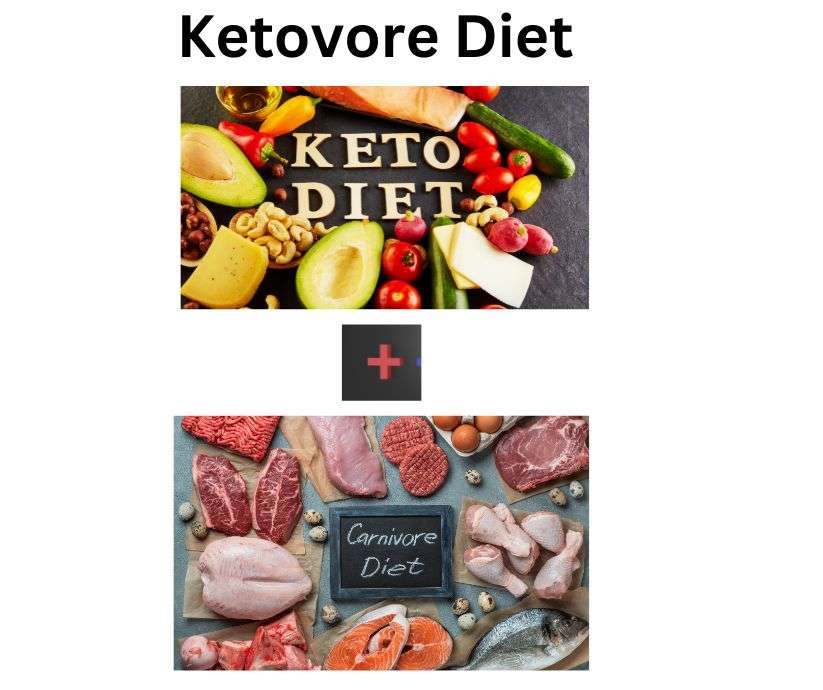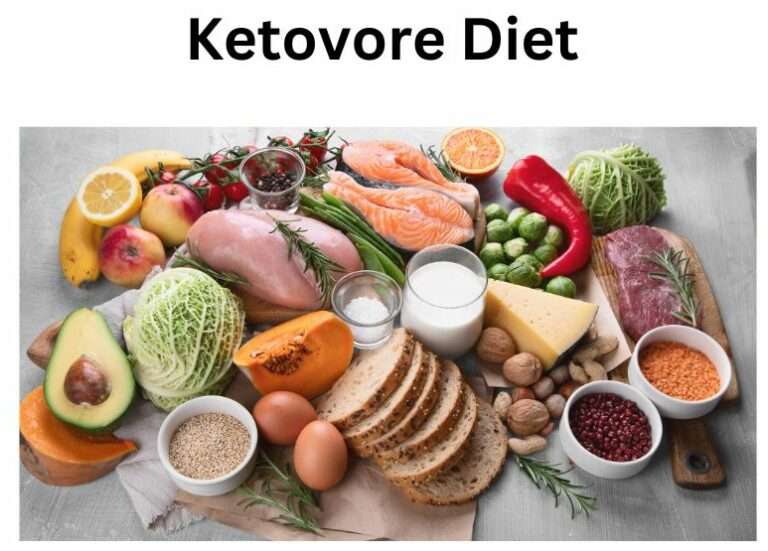Is there any diet that combines elements of the ketogenic diet and the carnivore diet? Yes. Ketovore Diet. Both the ketogenic diet and the carnivore diet have gained popularity in recent years, and the ketovore diet attempts to merge these two approaches.
What is a Ketogenic Diet?
The ketogenic diet is a low-carbohydrate, high-fat diet that aims to induce a state of ketosis in the body. In ketosis, your body primarily uses fat for energy, including dietary fat and stored body fat.
To achieve ketosis, you typically consume around 70-75% of your daily calories from fats, 20-25% from protein, and only 5-10% from carbohydrates. If you’re looking forward to losing some weight, then this diet is perfect for you. For example, for 2000 calories, there should be 165 grams of Fats, 75 grams of Protein, and 40 grams of Carbs.
What is the Carnivore Diet?
The carnivore diet, on the other hand, is an extremely restrictive diet that involves eating only animal products, primarily meat, and sometimes including dairy. It excludes all plant-based foods, including fruits, vegetables, grains, and legumes. The carnivore diet is based on the idea that an all-meat diet can improve health and alleviate various health issues.
In the context of the ketovore diet, individuals aim to combine the principles of the ketogenic diet with the focus on animal products from the carnivore diet.

This means that while following a keto diet, you would primarily consume animal-based foods while keeping your carbohydrate intake extremely low to maintain ketosis.
The primary foods in a keto diet include meats, fish, eggs, and high-fat dairy products. Some variations may include limited amounts of low-carb vegetables.
What is meant by Ketovore Diet?
A ketovore diet is a variation of the ketogenic diet that primarily focuses on consuming animal-based foods while minimizing or excluding plant-based foods.
This diet is quite restrictive and is characterized by a high intake of animal products, particularly meat, fish, and animal fats, while avoiding carbohydrates and most plant foods. By now, it is clear that Keto+ Carnivore=Ketovore

Keto vs Carnivore Diet
The ketogenic (keto) diet and the carnivore diet are two distinct dietary approaches, each with its own set of principles and objectives.
Let us compare the two.
Ketogenic Diet
1. Macronutrient Composition:
The keto diet is a high-fat, low-carbohydrate, and moderate-protein diet. Typically, around 70-75% of daily calories come from fats, 20-25% from protein, and only 5-10% from carbohydrates, whereas,
The carnivore diet is a highly restrictive diet that primarily consists of animal products, especially meat. It is virtually carbohydrate-free, as it excludes all plant-based foods.
2. Food Variety
The keto diet includes a wide variety of foods, such as dairy, nuts, seeds, non-starchy vegetables, and healthy fats like avocados and olive oil; whereas,
The carnivore diet includes meat (beef, poultry, fish), organic meats, and sometimes dairy. It excludes all fruits, vegetables, grains, legumes, and plant-based oils.
3. Carbohydrate Intake
The primary goal of the keto diet is to induce a state of ketosis, where the body burns fat for fuel instead of carbohydrates. To achieve this, carbohydrate intake is significantly limited to keep blood sugar and insulin levels low, whereas,
The carnivore diet is essentially a zero-carb diet. It eliminates all sources of carbohydrates, including fiber-rich foods.
4. Fiber and Nutrients
The keto diet allows for a wide range of nutrient-dense foods, including non-starchy vegetables, which provide fiber, vitamins, and minerals whereas,
Since it excludes plant-based foods, the carnivore diet lacks fiber and certain vitamins and minerals commonly found in fruits and vegetables.
5. Health Goals
The keto diet is often used for weight loss, improving metabolic health, managing blood sugar levels, and supporting conditions like epilepsy, whereas
Advocates of the carnivore diet claim that it can help alleviate various health issues, such as autoimmune conditions and digestive problems. However, scientific evidence for these claims is limited.
Key Differences
1. Plant Foods: The primary difference between the two diets is that the keto diet includes a variety of plant foods, while the carnivore diet eliminates them.
2. Carbohydrate Intake: The carnivore diet is more restrictive in terms of carbohydrate intake, aiming for nearly zero carbs, while the keto diet allows for a moderate amount of carbohydrates, mainly from non-starchy vegetables.
3. Fiber and Nutrients: The carnivore diet is notably deficient in fiber and certain vitamins and minerals due to its exclusion of plant-based foods.
Both diets have their proponents and critics, and their suitability may vary from person to person. It is essential to consider your individual health goals, preferences, and nutritional needs when deciding which, if any, of these diets are appropriate for you.
What are the Benefits of following the Ketovore Diet?
Here are some potential benefits and considerations of following a ketovore diet:
- Weight loss: Like the standard ketogenic diet, a ketovore diet can lead to weight loss due to its very low carbohydrate content. By minimizing carbohydrates, the body is forced to burn fat for energy, which can result in a decrease in body fat.
- Improved satiety: Due to the High-fat and protein-rich foods, your satiety is improved, and it helps to reduce hunger and overeating, making it easier to control calorie intake.
- Improved energy levels: Some individuals report increased mental clarity and sustained energy levels on a ketovore diet, as their bodies adapt to using ketones for fuel.
- Improved blood sugar control: A ketovore diet can lead to more stable blood sugar levels, making it beneficial for individuals with type 2 diabetes or those at risk of developing the condition.
- Reduced inflammation: By eliminating many high-carbohydrate and processed foods, the diet may help reduce inflammation in the body, potentially benefiting conditions like arthritis.
Drawbacks of the Ketovore diet
- Nutrient deficiencies: Excluding plant foods from your diet can lead to potential nutrient deficiencies, including fiber, vitamins, and minerals. It is essential to carefully plan your diet to ensure you’re meeting your nutritional needs.
- Limited food choices: The diet is highly restrictive and can be challenging to maintain in the long term, potentially leading to boredom and reduced dietary diversity.
- Digestive issues: Some people may experience digestive discomfort, such as constipation, when following a high-fat, low-fiber diet.
Conclusion
It is important to note that the keto diet is highly restrictive and may not provide a well-rounded source of nutrients. While it can lead to rapid weight loss and some people report improvements in specific health conditions, it may not be suitable for everyone, and its long-term effects on health are not well understood.
Related Articles:
Benefits and Health Risks of the Keto Diet
5 Easy Keto Thanksgiving Desserts


hey Manisha 🙂
Thanks for the article, it was very informative and helped me understand the Ketovore diet better. I’ve been thinking about trying it out, and your explanation of the differences between Keto and Carnivore diets really helped.
I’m curious, though: have you personally tried the Ketovore diet, and if so, what were your experiences with it? Did you notice any significant changes in your health or energy levels? Looking forward to hearing from you! 🙂
Hi Rafael,
I have tried the Vegetarian keto diet(you can find a post on this topic in my blog) and it really helped me to lose some weight. In the case where you are unable to live without a carnivore diet, the ketovore diet will also produce the same results. Thanks for the appreciation. Glad that you liked the post.
Hi. First of all well done on creating your website and this article. Overall it is a good article and contains a lot of useful information and goes into a lot of detail into the keto diet and carnivore diet.
One thing noticed is that you write ‘It is a carb free diet, as it is completely plant free.’ This sounds like you can not get carbs from other foods except plans. I would maybe change the wording.
Also you give a good list of benefits and drawbacks of the diet which is good for the reader to see both sides.
Have you thought about breaking it down and saying how many grams of carbs, protein and fats you should eat? You say percentage but some people find it hard to understand so maybe break it down and tell them how many grams of each nutrient they should have.
Overall it is a very good article. Keep up the good work ?
Hi Kevin,
First of all, I thank you for taking out time to read the article so thoroughly. I really appreciate it. I liked the idea of replacing percentages with quantities. Breaking down is indeed a great idea. Will update the same for better understanding.
Thanks again